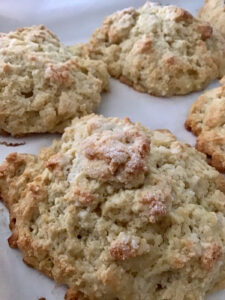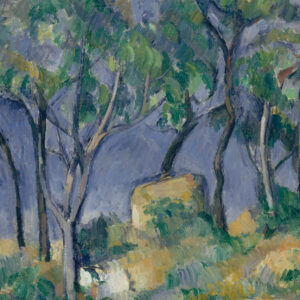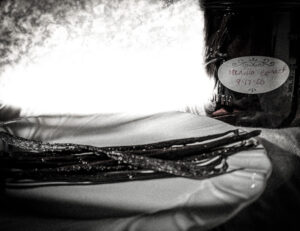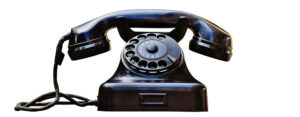
Spontaneous Music

Dr. Dixie Dillon Lane
One spring afternoon about ten years ago, after many hours of pain and considerable hard work, I sent up one last desperate prayer (“Have mercy!”) and a moment later found myself holding my second-born child in my arms for the very first time. I was profoundly relieved, and the baby was crying, and so, lying right there on the hospital bed while the doctors and nurses bustled about and my husband stood beside me, I began to sing to my son.
First, I sang to him his name. Then I sang that he was my boy, my heart’s joy, and my gift from God. I sang my emotions to an old folk tune retrieved from somewhere in my memory. I hardly knew, heard, saw, or felt anything beyond my child against my skin and the flowing music of my love for this little stranger.
At one point, I paused for a moment and discovered to my surprise that the room, though crowded, was completely silent. My doctor, a burly young resident sitting nearby, spoke up for the first time in many minutes: “Why did you stop singing?”
So on I sang.
One of the most powerful and widely shared human urges is the innate desire to express ourselves through music. I do not mean just music of the performed kind, played in a concert hall; nor recorded music, spliced and diced by audio engineers until it is “studio perfect”; nor even the communal music sung by a ragtag band in a pub. I am speaking, instead, of the spontaneous music of the individual interior life. This is the music that marks and mediates the ordinary and extraordinary moments of our existence.
This tradition of sudden, personal singing, innate to many human hearts and normative within many human cultures throughout history, is little appreciated today. Instead, when we think of music, we think primarily of performers and performance.
Performed, perfected music is artful and expressive and a great gift to the world. But as my experience at the birth of my son suggests, in terms of music’s overall nature, music need not be refined and practiced to be powerful and real. Authentic music can be of the instinctual variety, too. This very legitimate form of music can spring forth out of ordinary, even musically unskilled people as an elemental human expression of life. Training and talent elevate and enrich human music, but they are not necessary to its emergence.
Training and talent elevate and enrich human music, but they are not necessary to its emergence.
Yet this spontaneous music can make us uncomfortable, especially when it happens in public. While the Irish may still have their unplanned “sing-songs” of an evening, and you may still find the occasional American family that sings around the piano, most of us rarely sing together spontaneously, and even less often do we sing as individuals when others might overhear us.
Even planned social singing can be very awkward for those who fear that their singing is not up to snuff. Think of the last time the organist at church tried to get the congregation to sing an unfamiliar hymn. Or what about the last time you were walking along and found yourself humming a tune: Almost certainly, at some point you paused and checked behind you to make sure that no one was coming, did you not?
It is this nervousness that gets in the way of renewing our understanding of the spontaneity at music’s heart. We think that in order to be worthwhile, music has to be good, as in skillful or tonally perfect. It has to be performance-ready. In this view, music is something that most people consume, but only a favored few may create. Such music comes from the outside in, not from the inside out. We worry that our personal music, if we let it come forth, will not be good enough.
So let us acknowledge here a great and forgotten secret: Music does not have to be good to be both legitimate and worthwhile. That does not mean that every kind of organized sound deserves to be called music (I can think of some “songs” on the Top Forty that bear little resemblance to music at all), but just that it does not have to be practiced, does not have to be refined, and does not have to be performed. Indeed, unpolished music is often the most worthwhile. As the beat of my heart, which my son heard while in my womb, gave way to the first sounds of the wider world at his birth, someone else might well have been able to sing to him with more mastery of voice, but no one else could have sung to him with the voice of his mother.
Consider, then, honoring the urging of spontaneous music when next it strikes, releasing yourself from repressing it. When you are working or walking or even running along, when you are trying to outpace some inner emotional turmoil, allowing something of yourself to come forth in music may help relieve the pressure and even form a sort of prayer:
Roll on clouds in the morning
Roll on clouds in the morning
Let sun shine down on me
Or if you’re alone in a church, taking in the rich musty redolence of the ages, you might choose not to be shy of the Tabernacle or the fact that someone might walk in at any minute. Instead, open your mouth, and something may emerge, whether off-key or on:
Like the first morning
Blackbird has spoken
Like the first bird
You can stop if somebody seems bothered, or sing softly, or sing it in your head. Just don’t let self-consciousness stop you.
Maybe you, if a mother, will even find yourself singing during the thunderous contractions of active labor. That most vulnerable, most weakened, most exposed passage of our lives is also the most powerful, creative, and literally life-giving. What then have we to hide? If I turn my eyes and ego away from the overworked nurses around me, surely
While to that rock I’m clinging
For Love is Lord of heaven and earth
How can I keep from singing?
Such music in the home or chapel or birthing room is just as real as Mozart in Carnegie Hall — and though it may not be as excellent, it is no less essential.
Such music in the home or chapel or birthing room is just as real as Mozart in Carnegie Hall — and though it may not be as excellent, it is no less essential.
This is not to claim (with the modernists) that all art is equal, that music can exist without form or rule, or that beauty is entirely subjective. But consider: It is good for an Olympic athlete to run ten miles in a race, yet it is also good for you or me to run a quarter mile around the neighborhood, if only to get the wiggles out. It is good for a great author to write a novel, yet it is also good for anyone to write down a thought or a poem on a scrap of paper even if no one will ever read it. And likewise, it is good to study and perfect and perform music, yet it is also good to accept and express without judgment the innate music within us. You need not be a good singer in order for the act of your singing to be good.
Granted, for any particular person, music may simply not fill this creative role. Human beings process strong emotions in varying ways, depending on their personalities. Some, when provoked to anger or ecstasy, cannot rest until they have written it out in poetry or modeled it in clay or brushed it over a canvas. We do what is fitting to the person, the feeling, and the time. But the same principle is true for these things, too. Such creative acts are helpful not because they are perfect or perfectly performed, but rather because they belong to you and come forth from you — made, as you are, in the image and likeness of God, the Creator.
So go ahead and sing if you want to. Don’t reject your own music because you are not an Artist. Each one of us is an artist with a small “a,” not because we are so trained, or even so skilled, but because we are human. And these human instincts to art and action are natural, normal, and, indeed, sacred — they express something for us all.





















